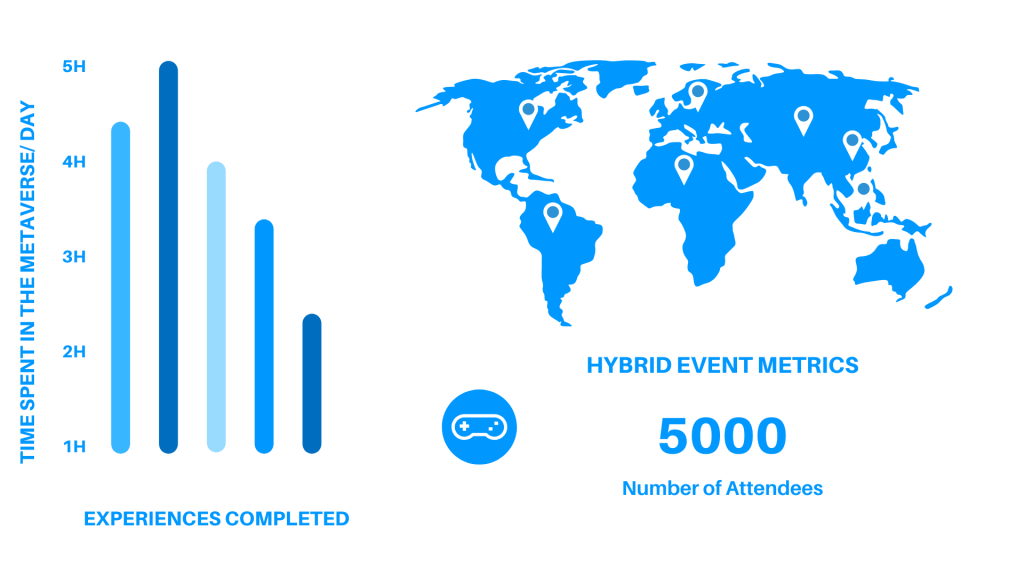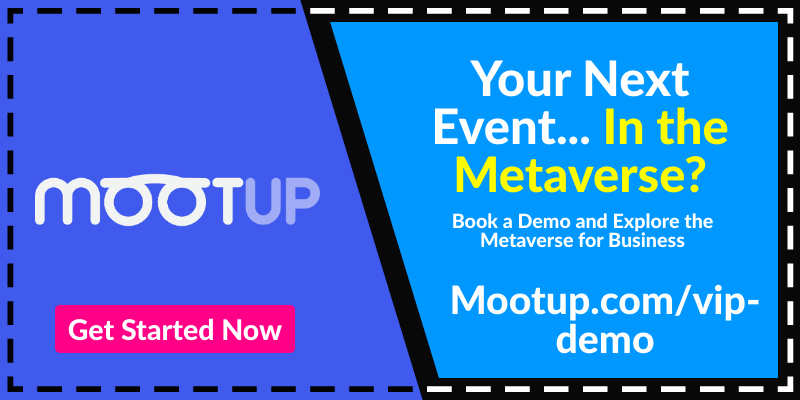As the event industry evolves, hybrid events are becoming increasingly popular. Hybrid events offer a unique combination of in-person and virtual experiences that benefit attendees and organizers alike. From improved engagement to cost savings, understanding the advantages of hosting a hybrid event is essential for success. In this article, we’ll delve into the benefits of hybrid events and features that make hybrid events unique and analyze the tech solutions available, as well as tips to guarantee a successful hybrid event.
Table of Contents:
- What is a Hybrid Event?
- Advantages of Hybrid Events for Attendees
- Advantages of Hybrid Events for Organizers
- Technology Solutions for Hosting Hybrid Events
- Best Practices for Hosting Successful Hybrid Events
- FAQs about the Benefits of Hybrid Events
- Conclusion
What is a Hybrid Event?
A hybrid event is an event that combines physical and virtual elements, allowing attendees to participate in person or virtually. The benefits of hybrid events offer the advantage of enabling a broader reach for organizers, merging the advantages of an in-person experience with the convenience and adaptability of participating remotely.
Definition of a Hybrid Event:
A hybrid event is an organized gathering that combines physical and virtual components. Attendees can join from anywhere worldwide, physically or through online platforms such as video conferencing tools, webinars, streaming services, etc. This type of event allows for more participant engagement than traditional events and increased attendance numbers due to its global reachability.
Types of Hybrid Events:
Several hybrid events include conferences, trade shows/exhibitions, corporate meetings & retreats, networking sessions & workshops. All these types have their advantages depending on what you want to achieve with your specific event, but all provide access to a broader range of attendees than just having it in person alone would allow for.
A hybrid event combines physical and virtual components to create a unique experience that can reach a wider audience. Let’s explore participants’ advantages of participating in a hybrid event, combining physical and digital elements to generate an unparalleled experience that a broader crowd can access.
Key Takeaway: Hybrid events perfectly combine physical and virtual elements, allowing for increased engagement between participants and more significant attendee numbers than traditional events. This event provides a unique opportunity to reach audiences globally with all the benefits of in-person gatherings but none of the constraints.
Advantages of Hybrid Events for Attendees
Hybrid events offer a range of advantages for attendees, including increased accessibility and reach, cost savings, and improved engagement opportunities.
Increased Accessibility and Reach:
Hybrid events provide greater access to attendees who may be unable to attend in person due to distance or other factors. By offering an online component alongside the physical event, hybrid events allow people worldwide to join virtually. This means organizers can attract more diverse audiences with different backgrounds, experiences, and perspectives. Additionally, virtual components are often recorded so those who couldn’t attend live can still view the content conveniently.
Cost Savings for Attendees:
Attending an in-person event is too expensive or logistically challenging for many potential attendees. With hybrid events, however, they can attend remotely, significantly reducing travel expenses such as airfare or hotel stays. Furthermore, there are often discounted rates available for remote participants compared to in-person ticket prices – providing even more incentive for them to participate in these events without breaking the bank.

By combining virtual and physical elements, hybrid events provide an opportunity for attendees to form meaningful connections regardless of their location. Through interactive features such as polls or chat rooms during virtual sessions, as well as social media hashtags before and after, organizers can create opportunities for conversations among participants both online and offline. This helps foster relationships between individuals across various locations while building a community around shared interests or topics discussed during the event.
Overall, hybrid events offer attendees unprecedented accessibility and cost savings while providing a unique platform for engaging with content. By leveraging the advantages of physical and virtual elements, organizers can benefit from increased visibility, reduced costs, and greater flexibility in event design.
Engagement simplified with moot – Your attendees can join your immersive 3D experience on any device, from smartphones to VR headsets, in a single click. Mix in gamification, 1,000+ gestures, and a slew of social interactions, and instant engagement is built right in.
Key Takeaway: Hybrid events offer many benefits to attendees, including increased accessibility and reach for global audiences, cost savings through virtual components, and improved engagement opportunities. By combining physical and online elements in their event designs, organizers can create an inclusive environment where meaningful connections between participants are fostered remotely and onsite.
Advantages of Hybrid Events for Organizers
Hybrid events are growing in popularity amongst event planners, as they offer numerous benefits over traditional physical occasions. With hybrid events, organizers can combine the best aspects of both virtual and physical gatherings to create an engaging experience that reaches more people than ever before.
Organizers who host hybrid events benefit from increased visibility and brand awareness. By combining virtual and physical elements into one event, organizations can reach new audiences across different geographic locations or countries. This opens up potential opportunities for sponsorships and partnerships with companies that may not have been able to participate in a purely physical gathering. Additionally, hosting a hybrid event provides greater flexibility regarding marketing strategies such as social media campaigns or email blasts since attendees can join virtually if necessary.
Organizers can reap the benefits of reduced costs and logistical challenges when hosting a hybrid event compared to its traditional counterparts. By incorporating an online component, organizations can save on expensive venue rentals or catering services while still providing attendees quality content regardless of location or budget constraints. Moreover, many platforms used for virtual components come packed with features such as registration pages or live streaming capabilities that obviate manual processes like ticketing systems or recording sessions before uploading them online post-haste, thereby further cutting down on expenses.
Organizers of hybrid events benefit from increased visibility and brand awareness, reduced costs and logistical challenges, and greater flexibility in design and execution. Leveraging technology solutions for hosting hybrid events can further amplify the advantages of this event format to create an unforgettable experience for attendees.
Key Takeaway: Hybrid events offer event organizers a great opportunity to reach more people, reduce costs and logistical challenges, and gain greater visibility. By leveraging the benefits of both virtual and physical gatherings, organizations can achieve greater reach, cost-efficiency, and visibility.
Technology Solutions for Hosting Hybrid Events
Technology solutions are essential for hosting hybrid events, allowing organizers to create an engaging experience that reaches virtual and in-person attendees. Virtual platforms provide a central hub for online events, while live-streaming solutions enable remote participants to join the action. Augmented reality experiences can enhance engagement by delivering interactive elements that add another layer of immersion.
Virtual Platforms for Online Events:
To host a significant online event, you need a platform designed specifically for this purpose. Such platforms offer features like video conferencing capabilities, chatrooms, breakout rooms, polling options, and more – all within one centralized space. This makes it easy to facilitate large groups or hold multiple sessions simultaneously with different audiences without worrying about technical or device compatibility problems. Additionally, many virtual platforms come equipped with analytics tools that give you insights into who’s attending your event and how they’re interacting with the content so you can make data-driven decisions about future events.
Live Streaming Solutions for Remote Attendees:
Live streaming is becoming increasingly popular as people look for ways to connect virtually during pandemic times and beyond. Services such as YouTube Live or Twitch enable users to broadcast their event directly from their computer or mobile device in real time – perfect if you want remote participants to be able to watch what’s happening at the physical location of your hybrid event live as it happens. These services also offer additional features such as audience interaction tools (chat boxes), monetization options (donations), and even cloud recording capabilities that let viewers watch past broadcasts anytime after they have ended.
Technology solutions for hosting hybrid events are essential to ensure a successful and engaging experience. A preplanning strategy and proficiently utilizing tech solutions are necessary for an event’s success; these topics will be discussed further in the following section.
Key Takeaway: As an advanced professional, I can summarize that hybrid events benefit from virtual platforms and live streaming solutions that offer features such as video conferencing capabilities, chatrooms, and analytics tools. These enable organizers to create an engaging experience for in-person attendees and those joining remotely by providing interactive elements with augmented reality experiences or watching past broadcasts anytime after they have ended.
Best Practices for Hosting Successful Hybrid Events
Hosting a successful hybrid event requires careful preplanning, leveraging the right technology solutions, and engaging remote attendees. Here are some tips to help guarantee the success of your upcoming hybrid event.
Preplanning Strategies to Ensure Smooth Execution:
Hybrid events require more planning than traditional in-person events due to the added complexity of managing both physical and virtual components. It’s essential to start early by creating detailed plans for each event component, such as registration, logistics, technical setup, marketing, etc. Additionally, it’s essential to test all technologies before the event day so that any issues can be addressed ahead of time.
Engaging remote attendees is imperative for a successful hybrid event. To maximize engagement, consider providing interactive experiences such as polls or Q&A sessions; utilizing live streaming tools like Zoom or WebEx; appointing dedicated moderators to respond quickly and adeptly; splitting large groups into smaller breakout rooms; incorporating video content into presentations; and offering incentives for participation including giveaways or discounts on products/services relevant to your brand/event topic. Keywords: Engage, Maximize, Interactive Experiences, Live Streaming Tools, Dedicated Moderators, Breakout Rooms, Video Content Incentives
For technology solutions like virtual platforms and augmented reality (AR) experiences to be effective at enhancing engagement during hybrid events, they must be used strategically and with purposeful intent. For example, AR could be used with an audience polling feature so that participants can see their responses reflected visually in real-time – this creates an immersive experience that encourages further engagement from viewers at home or onsite. Other ideas include integrating AI chatbots into registration forms or utilizing facial recognition software for check-in purposes. These strategies allow organizers greater flexibility when it comes time to plan their next hybrid event.
Key Takeaway: Hybrid events require extra planning and engagement tactics to ensure success. Preplanning, leveraging technology solutions, interactive experiences such as polls or Q&A sessions, and offering incentives for participation are critical components of executing a successful hybrid event. Utilizing AR with audience polling features, AI chatbots, and facial recognition software can create an immersive experience that encourages further engagement from onsite and remote viewers.
FAQs about Benefits of Hybrid Events
What are the benefits of a hybrid event?
Hybrid events combine the best of both virtual and in-person experiences. Blending online and offline elements gives attendees greater flexibility to participate when it suits them. Hybrid events also offer more opportunities for collaboration between remote participants and expanded reach across multiple locations. Additionally, organizers can save on costs associated with physical event spaces while still providing a high-quality experience to their audience. Finally, hybrid events are an environmentally friendly option that reduces emissions from travel by allowing people to attend virtually instead of physically traveling long distances.
How do hybrid events capture the benefits of virtual and in-person events?
Event professionals can create immersive 3D environments for their guests to explore from their homes by utilizing a no-code platform. Guests can engage in activities such as video chats, audio streams, and gaming or trivia competitions with each other both virtually and in person. At the same time, hybrid events offer an opportunity to physically bring people together by hosting smaller gatherings at locations connected virtually via streaming technology. This allows attendees to benefit from social interaction while still being able to maintain safety protocols like physical distancing guidelines. Hybrid events thus provide a unique solution that captures all the benefits of virtual and in-person events without compromising on either one’s experience.
How do hybrid events increase potential sponsorship opportunities?
Hybrid events offer a unique opportunity for sponsors to reach virtual and in-person audiences. By combining the best of both worlds, hybrid events provide greater exposure than traditional physical or digital-only experiences. Sponsors can take advantage of amplified visibility with tailored marketing efforts, utilizing various channels such as social media posts, emails, and other online avenues. Additionally, they have access to more data on event attendees, which helps them better understand their target audience’s needs and preferences. Hybrid events also create opportunities for sponsors to engage with customers through interactive activities such as live-streaming content or Q&A sessions during the event itself. These factors combine to make hybrid events an excellent way for sponsors to reach more people and increase their potential return on investment.
Are hybrid events successful?
Yes, hybrid events have been successful. Combining physical and virtual elements allows these events to reach a larger audience while allowing for meaningful interaction between attendees. Hybrid events present a chance to use different tech to create engaging, unforgettable encounters. Furthermore, they enable event organizers to reduce costs by eliminating travel expenses associated with attending an event in person.
Conclusion
The benefits of hybrid events are clear:
They offer attendees and organizers the best of both worlds, allowing them to experience a unique event that combines in-person and virtual elements. For organizers, it is essential to invest in technology solutions that will ensure smooth execution while also following best practices for hosting successful hybrid events. one of the benefits of hybrid events is that with these tools at their disposal, organizations can create truly memorable experiences for all involved.
With the MootUp platform, you can ensure the future readiness of your Metaverse event technology infrastructure. The browser-based platform provides easy access to all attendees, regardless of their smartphone, tablet, laptop, or VR/AR headset, without downloading or installing software.
Take your events to the next level with MootUp! Our no-code platform allows you to easily create and host virtual and hybrid events in the metaverse, so you can reap all the benefits of having an online and offline presence.

